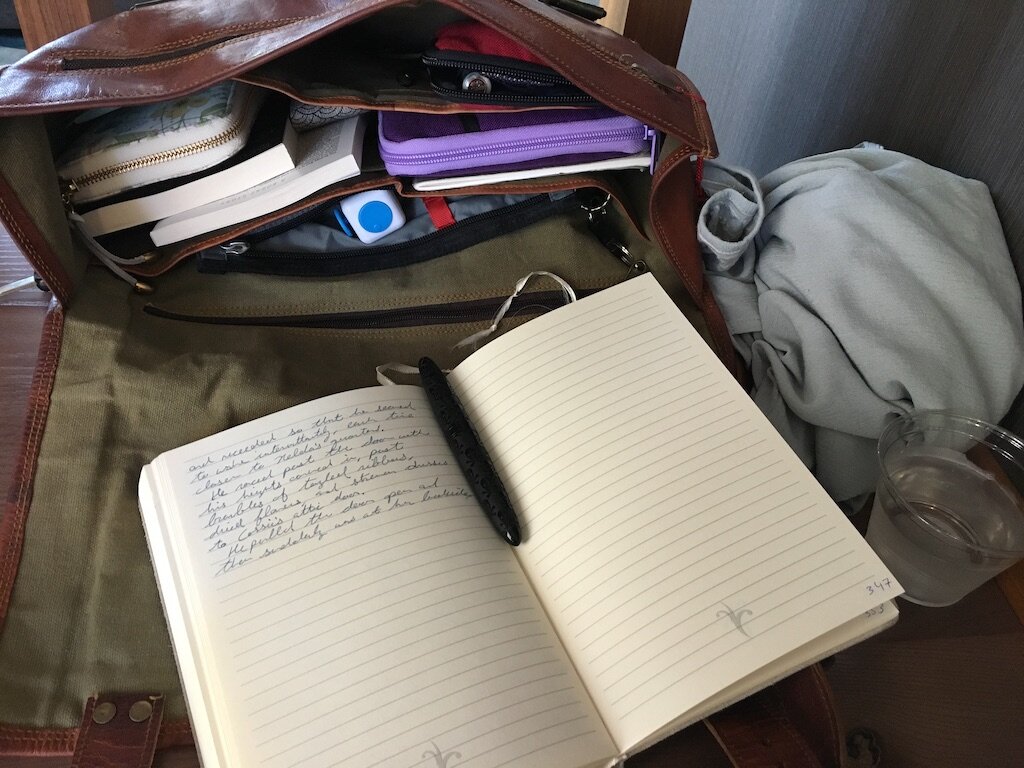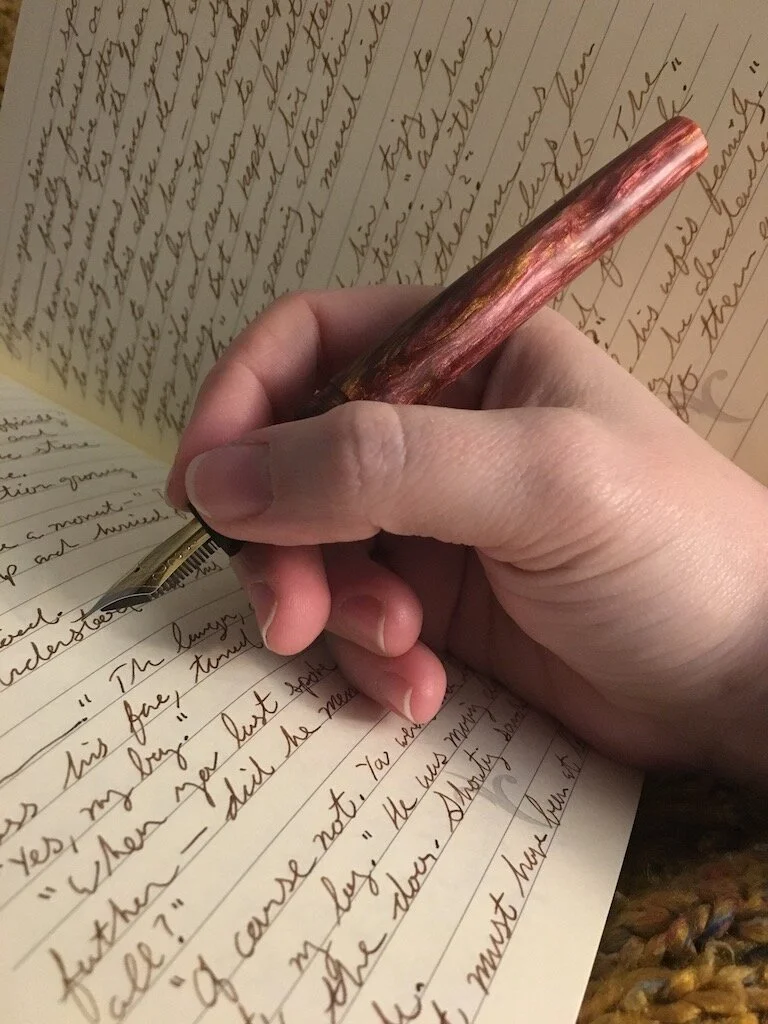(Sarah Read is an author, editor, yarn artist, and pen/paper/ink addict. You can find more about her at her website and on Twitter. And check out her latest book, Out of Water, now available where books are sold!)
Hand writing my books and stories brings me a lot of joy. I think more clearly and creatively with pen and paper, I get to use my fine pens and fun inks in useful color codes. I use beautiful journals that inspire me, and I have a keepsake of the project when I'm through.
The problem with it is that the project isn't through after I've written the book. It's still a celebration, of course, when I scrawl 'The End' across the bottom of the last page. It's a book! A completed manuscript! But, in a way, it really isn't. In our digital age, the handwritten draft doesn't do many of the things that we need drafts to do. I can certainly mark up my written pages with some basic edits, but first drafts require so much more than basic edits. There's not much point to proofreading a chapter that needs to be entirely restructured, for example. That sort of fine-grit polish typically comes last in the edit process. No, once the book is handwritten, the first thing I need to do... is type it up.
I hate typing. I did learn how to type in school and I'm actually quite fast and reasonably accurate--but typing the contents of an entire book is time consuming and tedious. I do make some edits and changes as I type, so I still find the process useful. Once it's over, I'll even say it was worth it. But while I'm in the middle of it (which is right now, with my current project), it's a form a of torture that makes me question my life choices.
There are alternatives to typing. I've used Google Voice to transcribe my stories as I read them from my handwritten pages. It works surprisingly well, though it struggles with homonyms, unusual spellings, and punctuation. Turns out, there's a lot of punctuation in books. By the time I go back through and fix the mess, I might as well have been typing it myself. It's not so bad for a short story, but I think it would overcomplicate matters in a longer project. I've heard that the Dragon software is excellent for voice-to-text. There's a learning curve for getting it to do what you need it to, but everyone I know who has used it, swears by it. The downside to Dragon is the cost--it's $300 for the version best suited to professional writers. That's quite the barrier to entry. I think it would be worth it, and if I ever reach a point in my career where manuscripts can't wait for my reluctant typing, I'll probably invest in it.
So how long does it take me to type a book? Including the time I spend editing, rewording, and actually typing, it's about ten minutes for every 250 words. Most novels are between 50,000 and 90,000 words, with my current project hitting that upper limit. On a very focused day, if I use all my spare time available, I might get ten to fifteen pages typed, of what will likely be a four-hundred-page book. I don't have a lot of very focused days, or much spare time, typically, which is why I'm still typing the book I wrote over a year ago. When I look at it that way, I kick myself for being so inefficient and seriously consider giving up the hand writing practice. After all, if I typed my rough drafts, I'd have an actual, editable draft at the end of it! My writer friends think I'm crazy.
Here's why I'm not. I mean. Not in this way. For one, my notebook goes with me everywhere. I write everywhere. My first drafts happen quickly--it's not weird for me to write a novel's worth of material in a month. NaNoWriMo is every month for a working writer. And as a working mom who is also a working writer, being able to take my work with me is extremely valuable. Also, by the time I've typed this book, it's no longer a first draft. It's really something closer to a third draft, with all of the structural fixes in place and sentence-level smoothing happening as I go. By the time the typing is done, the book is in a state where I'd have no trouble showing it to a colleague. All the embarrassing mistakes where character's names change partway through are gone. Does it really take typists less time to get from a blank page to a third draft? I'd argue that the same amount of time is spent in both methods, just that it's weighted differently. Also, you know how in school, you're always told that copying your notes is the most efficient way to study? Writing commits things to memory. There's plenty of research on that. I'd argue that, by hand writing my book, I'm retaining more of it in my memory. And then by going back over the entire thing and typing it all out again, I'm committing even more of the story to mind. This is extremely useful in edits, because the more of the details I remember, the less likely I am to introduce inconsistencies later when I add new material or change something. Knowing your story in every detail is undoubtedly a time-saver.
Still, people are going to shake their heads at this method, and I don't blame them. This post wasn't made to convince them, so much as it is to remind me, while I am now in the middle of typing hell, that the process is worth it. That the process is important. That the process, is, actually the fun part, and why I do this all to begin with.
I also need a darn good excuse to justify all these pens and notebooks.
Enjoy reading The Pen Addict? Then consider becoming a member to receive additional weekly content, giveaways, and discounts in The Pen Addict shop. Plus, you support me and the site directly, for which I am very grateful.
Membership starts at just $5/month, with a discounted annual option available. To find out more about membership click here and join us!










